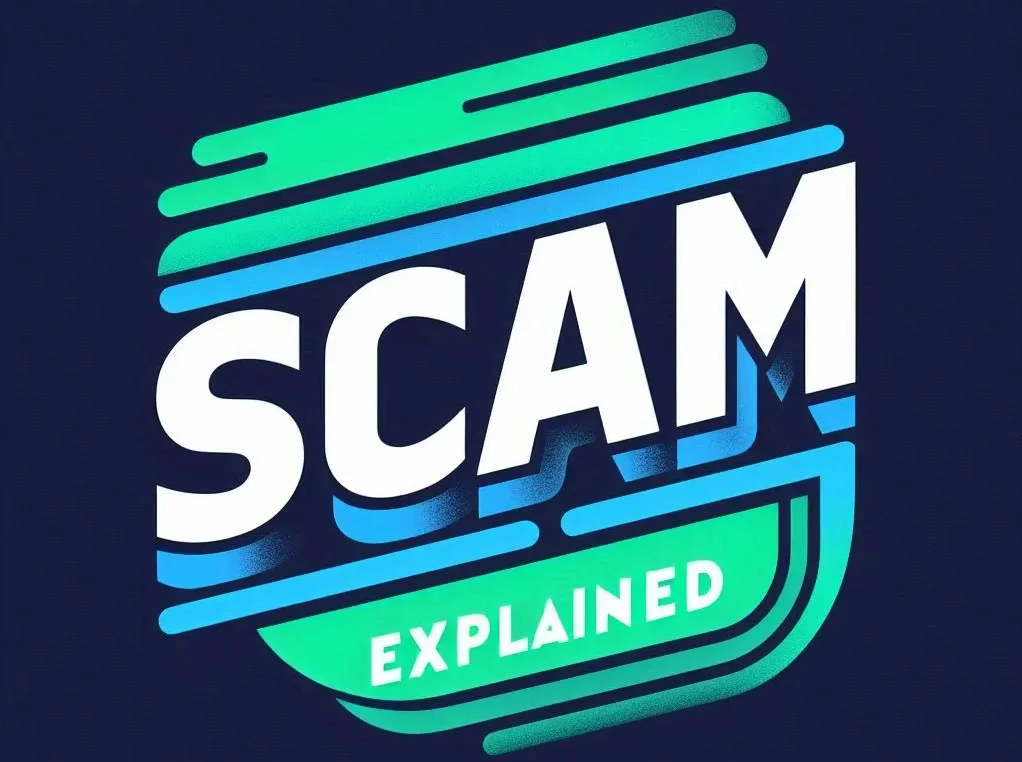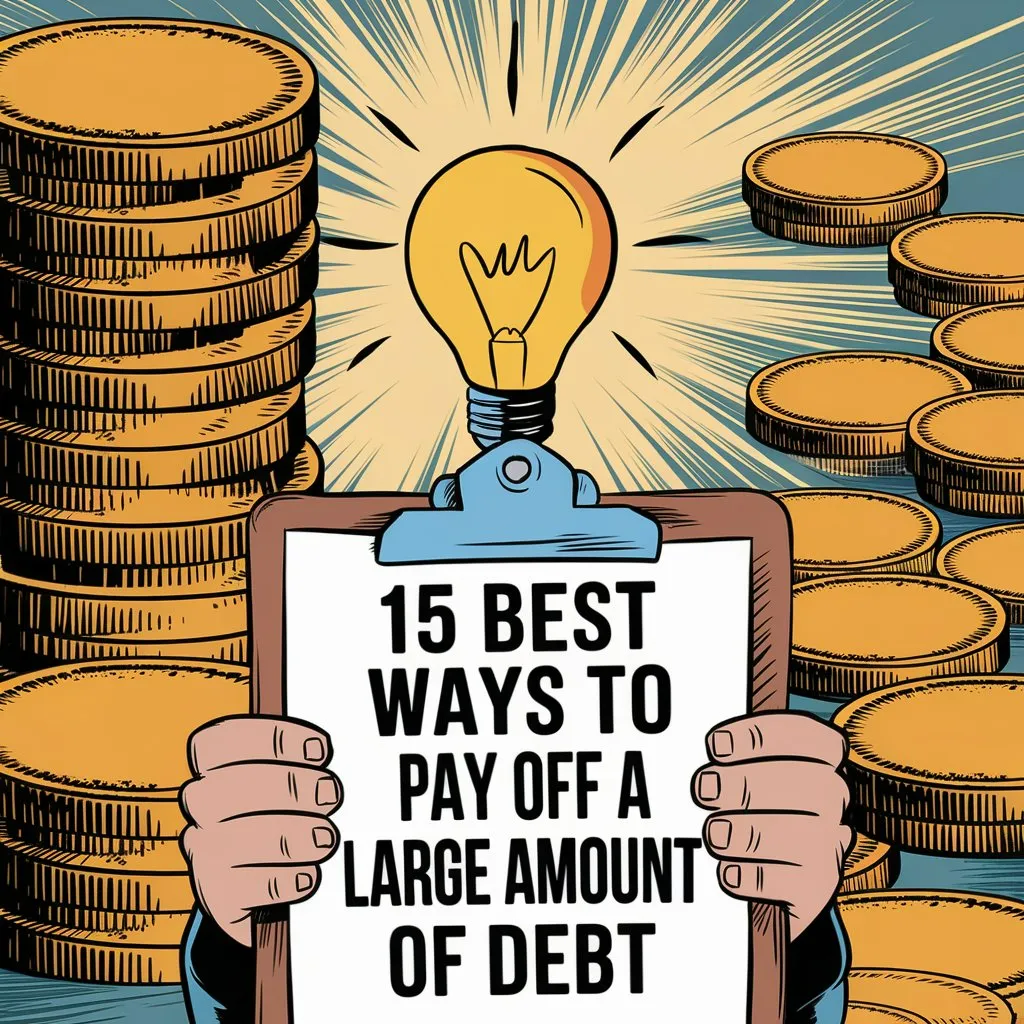You’re facing a formidable task: paying off a large amount of debt. It’s overwhelming, but don’t let it paralyze you. Start by taking control of your finances and creating a realistic budget plan that works for you.
Prioritize your high-interest debts and consider strategies like the debt snowball method or the 50/30/20 rule to make the most of your income.
But that’s just the beginning – there are more effective ways to tackle your debt, from negotiating with creditors to automating your payments. What else can you do to break free from debt’s grip?
At a Glance
- Create a realistic budget plan to track income and expenses, allocating income effectively towards debt repayment.
- Prioritize high-interest debts first, making minimum payments on other debts to save on interest costs.
- Increase income streams through side hustles, passive income, and selling unwanted assets to put more towards debt repayment.
- Consider debt consolidation or debt management plans to lower interest rates and simplify payments.
- Automate debt payments to guarantee consistent payments, avoid late fees, and enjoy convenience and peace of mind.
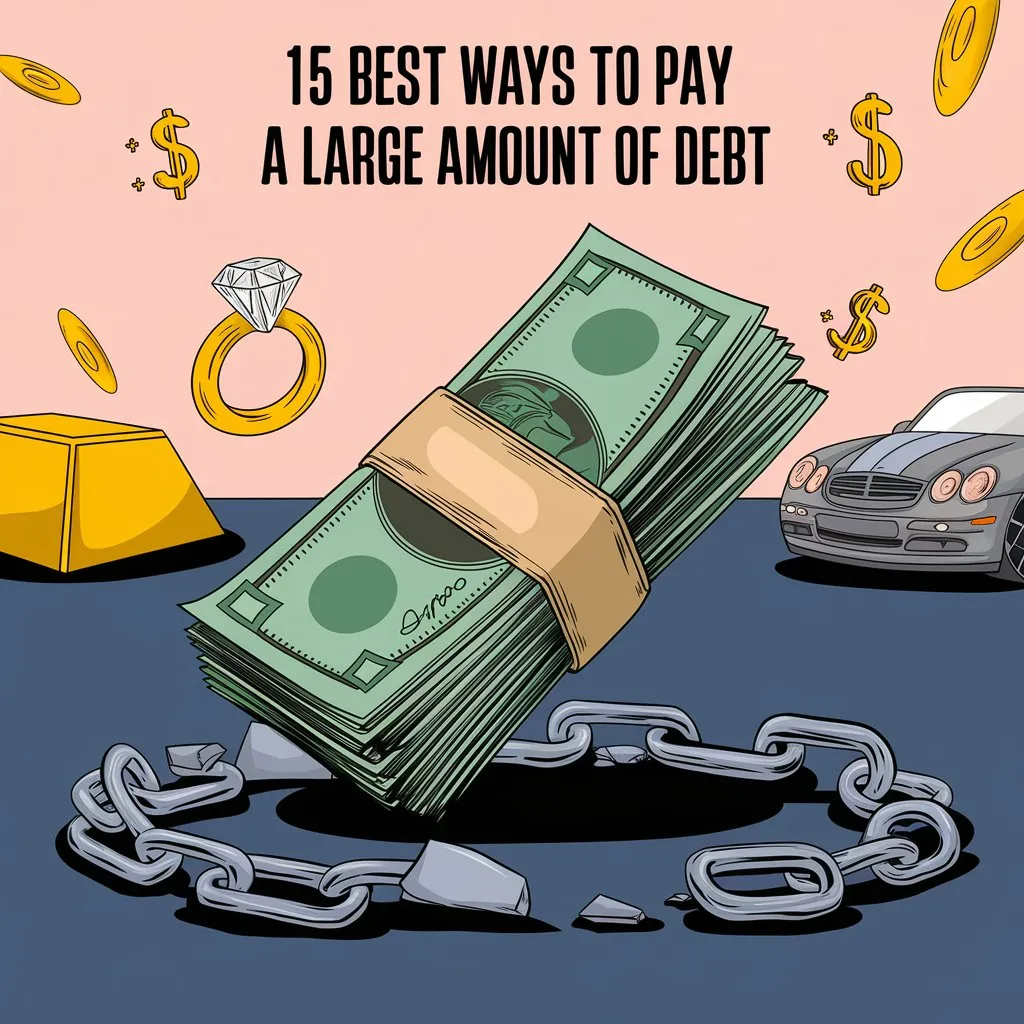
Create a Realistic Budget Plan
By taking control of your finances and creating a realistic budget plan, you’re making a crucial step towards paying off debt.
This plan will serve as a roadmap to achieving your financial goals, helping you allocate your income effectively and make conscious spending decisions.
Start by tracking your income and expenses to identify areas where you can cut back and allocate more funds towards debt repayment.
Next, prioritize building an emergency fund to cover three to six months of living expenses.
This fund will provide a cushion against unexpected expenses, ensuring you don’t accumulate more debt when unexpected costs arise.
Be realistic about your spending habits and expenses, and make adjustments as needed.
A well-crafted budget plan will help you stay on track, ensuring you’re making consistent progress towards paying off your debt.
Prioritize High-Interest Debts First
Now that you have a realistic budget plan in place, it’s time to tackle the debt itself.
To make the most of your debt repayment strategy, prioritize your debts by focusing on the ones with the highest interest rates first. This approach is known as the debt ranking method or the interest ladder.
By targeting the debts with the highest interest rates, you’ll save money on interest charges over time and pay off your debt more efficiently.
Start by listing all your debts, along with their corresponding interest rates.
Then, rank them from highest to lowest interest rate. This will give you a clear picture of which debts to prioritize.
Make the minimum payments on all debts except the one with the highest interest rate. For that one, pay as much as possible towards the principal amount.
Once you’ve paid off the debt with the highest interest rate, move on to the next one on the list, and so on.
Cut Expenses and Save Money
Nearly a third of your income likely goes towards debt repayment, which can be overwhelming.
To free up more money in your budget for debt repayment, crucially, you must cut expenses and save money. Adopting a frugal lifestyle can help you achieve this goal.
Start by tracking your expenses to identify areas where you can cut back. Make a list of your daily expenses, no matter how small, to get a clear picture of where your money is going.
You’ll likely be surprised at how much you can save by making small changes, such as cooking at home instead of eating out or canceling subscription services you don’t use. By cutting back on unnecessary expenses, you can allocate more money towards debt repayment and accelerate your journey to financial freedom.
Consider Debt Snowball Method
You’ve cut expenses and saved money, freeing up more of your income to tackle debt.
Now it’s time to prioritize your debt repayment. The debt snowball method is a popular approach that involves paying off debts in a specific order, typically from smallest to largest.
This method provides a psychological boost as you quickly eliminate smaller debts, giving you momentum and motivation to continue.
Here’s how it works:
- List your debts: Write down all your debts, from smallest to largest, along with their corresponding balances and interest rates.
- Focus on the smallest: Pay the minimum on all debts except the smallest one, which you’ll pay as much as possible towards.
- Celebrate and repeat: Once you’ve paid off the smallest debt, use that money to tackle the next smallest debt, and so on.
This method is effective because it helps you avoid emotional spending and stay focused on your debt prioritization.
Negotiate With Creditors Directly
Your creditors may be more willing to work with you than you think. They may be open to negotiating a settlement, especially if you’re struggling to make payments.
Reach out to them directly and explain your situation. Be honest about your financial difficulties and propose a plan to settle the debt. You may be able to negotiate a lump sum payment that’s less than the original amount owed. This is known as debt forgiveness, and it can be a huge relief.
Keep in mind that debt forgiveness can affect your credit scoring, so it’s crucially important to understand the implications before agreeing to a settlement. However, if you’re deep in debt, the benefits of debt forgiveness may outweigh the potential impact on your credit score.
Be prepared to provide financial documentation to support your proposal, and don’t be afraid to negotiate. Remember, your creditors want to get paid, and they may be willing to work with you to find a solution that benefits both parties.
Consolidate Debt Into One Loan
If negotiating with creditors directly doesn’t yield the desired results, consolidating debt into one loan can be a viable alternative.
This approach simplifies your financial situation by combining multiple debts into a single loan with a fixed interest rate and monthly payment.
You’ll only need to worry about making one payment each month, which can help you stay on track and avoid missed payments.
By consolidating your debt, you can:
- Reduce your interest rate: You may be able to secure a lower interest rate than what you’re currently paying on individual debts, saving you money over time.
- Lower your monthly payment: Consolidating your debt can lead to a lower monthly payment, making it more manageable and freeing up more room in your budget.
- Streamline your finances: Debt refinancing can simplify your financial situation, making it easier to keep track of your payments and stay on top of your debt.
When consolidating your debt, be sure to carefully review the loan terms to confirm you’re getting a good deal.
This can help you achieve debt freedom faster and with less financial stress.
Use Debt Repayment Calculators
Debt repayment calculators are powerful tools that can help you create a personalized plan to tackle your debt.
These online calculators provide a clear picture of your debt situation, enabling you to make informed decisions about your repayment strategy. By using debt analysis tools, you can input your debt amounts, interest rates, and desired payoff timeframe to receive a customized plan that suits your financial situation.
With a debt repayment calculator, you can experiment with different scenarios to see how making extra payments or paying more frequently can impact your debt.
You’ll also get an estimate of how long it’ll take to pay off your debt and how much you’ll save in interest. This information empowers you to create a realistic plan that fits your budget and goals.
Online calculators are readily available and easy to use, making it simple to get started on your debt repayment journey.
Take Advantage of Balance Transfer
Credit card companies often lure customers with enticing balance transfer offers, promising zero-interest rates or low fees for a promotional period.
If you’re struggling with debt, taking advantage of these offers can be a smart move. By transferring your balance to a new credit card with a lower or zero-interest rate, you can save money on interest charges and focus on paying off the principal amount.
Three factors to weigh when evaluating balance transfer offers:
- Transfer fees: Make sure you understand the fees associated with the transfer, as they can add up quickly.
- Credit score: Check your credit score to see if you qualify for the best balance transfer offers.
- Promotional period: Understand the length of the promotional period and make a plan to pay off your debt before the offer expires.
Increase Your Income Streams
By now, you’ve likely trimmed expenses and optimized your debt repayment strategy, but it’s time to flip the script and focus on growing your income.
Increasing your income streams is a powerful way to accelerate debt repayment and achieve financial freedom.
One effective approach is to explore side hustles, such as freelance work, that can supplement your primary income. This could be writing, designing, or consulting – the possibilities are endless.
You can also tap into the gig economy by driving for a ride-sharing service, delivering food, or completing tasks on task-based platforms.
Another option is to create passive income streams, such as investing in dividend-paying stocks, peer-to-peer lending, or creating and selling digital products.
By diversifying your income sources, you’ll be better equipped to tackle your debt and build a more sustainable financial future.
Sell Unwanted Assets and Items
Your unwanted assets and items can be a hidden treasure trove of cash, waiting to be tapped to tackle your debt.
It’s time to declutter and turn those dust-gathering possessions into debt-busting dollars.
Take inventory of your belongings and identify items you no longer need or use.
Consider selling them through:
- Online marketplaces: Websites like eBay, Craigslist, or Facebook Marketplace can connect you with potential buyers.
- Garage sales: Host a yard sale or garage sale to get rid of multiple items at once.
- Consignment shops: Partner with local consignment shops to sell gently used items like clothing, furniture, or electronics.
These platforms can help you turn unwanted assets into cash, which you can then apply directly to your debt.
Be realistic about the prices you set, and don’t be afraid to negotiate.
Remember, every dollar earned brings you closer to debt freedom.
Leverage Debt Management Plans
Now that you’ve tapped into the cash potential of your unwanted assets, it’s time to explore another strategic approach to tackling your debt.
Leverage debt management plans to take control of your finances and create a clear path to becoming debt-free. Debt counseling services can help you develop a personalized plan to pay off your debt, often by consolidating multiple debts into one lower monthly payment.
These services may also provide credit coaching to help you understand your credit report, identify areas for improvement, and make positive changes to your credit score over time.
Through debt management plans, you can benefit from lower interest rates, waived fees, and even debt forgiveness in some cases.
These plans are typically offered by non-profit credit counseling agencies, which can provide you with expert guidance and support throughout the process.
By leveraging debt management plans, you can simplify your finances, reduce your debt burden, and make progress toward achieving financial freedom.
Take the next step toward debt relief by exploring debt management plans and finding a reputable provider to help you achieve your goals.
File for Bankruptcy (as Last Resort)
Filing for bankruptcy should be a last resort in your debt relief journey, as it can have long-lasting and far-reaching consequences on your credit score and financial future.
While it may seem like an easy way out, bankruptcy options should only be pondered when all other avenues have been depleted.
- Credit score impact: Bankruptcy can dramatically lower your credit score, making it difficult to secure loans or credit in the future.
- Public record: Bankruptcy filings are public records, which can be embarrassing and may affect your personal and professional relationships.
- Long-term financial restrictions: Bankruptcy can impose strict financial constraints, limiting your ability to obtain credit, loans, or even rent an apartment.
Before pondering bankruptcy, explore alternative debt relief options, such as debt management plans or debt consolidation.
Verify the pros and cons of bankruptcy carefully and seek professional advice to guarantee you’re making an informed decision.
Use the 50/30/20 Rule Effectively
As you navigate the process of paying off debt, it’s time to focus on proactive strategies that can help you regain control of your finances.
One effective approach is to apply the 50/30/20 rule, which allocates your income into three categories. Fifty percent should go towards necessary expenses like rent, utilities, and food.
Thirty percent is for discretionary spending, such as entertainment, hobbies, and personal expenses. The remaining twenty percent is dedicated to debt repayment and savings.
To make the most of this rule, categorize your expenses to identify areas where you can cut back and allocate more funds towards debt repayment.
Review your budget and prioritize essential expenses, ensuring you’re not overspending in any category. By allocating a significant portion of your income towards debt repayment, you’ll be able to tackle your debt more efficiently.
Additionally, consider debt allocation strategies, such as the snowball or avalanche methods, to optimize your debt repayment plan.
Automate Your Debt Payments
Your debt repayment journey can become less stressful and more manageable by automating your debt payments.
By setting up automatic payments, you’ll guarantee that you never miss a payment, which can help you avoid late fees and penalties.
This approach also helps you stick to your payment schedules and avoid debt reminders that can be stressful.
- Consistency: Automatic payments guarantee that you’re making consistent payments towards your debt, which helps you stay on track with your repayment plan.
- Convenience: You don’t have to worry about remembering to make payments or dealing with paperwork, freeing up time and energy for other important tasks.
- Peace of Mind: Automating your debt payments gives you peace of mind, knowing that your payments are being made on time, every time.
Seek Professional Credit Counseling
Frequently, individuals struggling with debt find themselves overwhelmed and unsure of where to turn for guidance.
If you’re in this situation, consider seeking professional credit counseling. A reputable credit counseling agency can provide you with personalized advice and guidance to help you manage your debt.
A qualified debt counselor will analyze your credit report, identifying areas for improvement and opportunities to reduce debt.
They’ll also help you create a customized plan to pay off your debt, which may include negotiating with creditors, consolidating debt, or developing a budget.
When searching for a debt counselor, look for qualifications such as certification from a reputable organization like the National Foundation for Credit Counseling (NFCC).
Additionally, verify the agency is accredited by a third-party organization, like the Council on Accreditation (COA).
FAQs
Can I Still Use Credit Cards While Paying off Debt?
While paying off debt, you’re tempted to use credit cards, but consider a credit freeze to avoid overspending. Shift your debt mindset: prioritize needs over wants, and you’ll stay on track to financial freedom.
How Long Will It Take to Pay off Debt With Minimum Payments?
You’ll be stuck paying off debt for years if you only make minimum payments, but you can speed things up with debt snowflaking and payment acceleration strategies, which can shave years off your repayment timeline.
Can I Deduct Debt Repayment on My Taxes?
You won’t directly deduct debt repayment on your taxes, but you might benefit from tax implications of debt forgiveness, such as excluding forgiven amounts from income, depending on the type of debt and forgiveness program.
Will Paying off Debt Hurt My Credit Score in the Short Term?
When you aggressively tackle debt repayment, your credit score might temporarily dip due to credit utilization changes or closed accounts; however, you’re investing in long-term financial freedom, and a stronger credit score will follow as you implement effective debt repayment strategies.
Can I Pay off Debt Without Sacrificing My Quality of Life?
You can pay off debt without sacrificing your quality of life by making strategic budget adjustments and finding creative lifestyle compromises that prioritize your needs, allowing you to tackle debt while still enjoying the things that matter most.
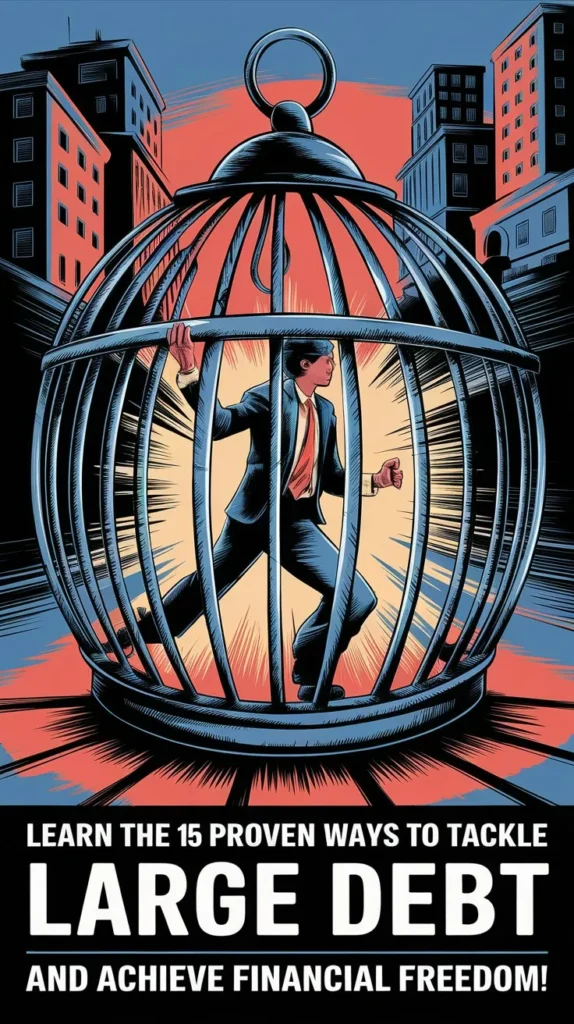
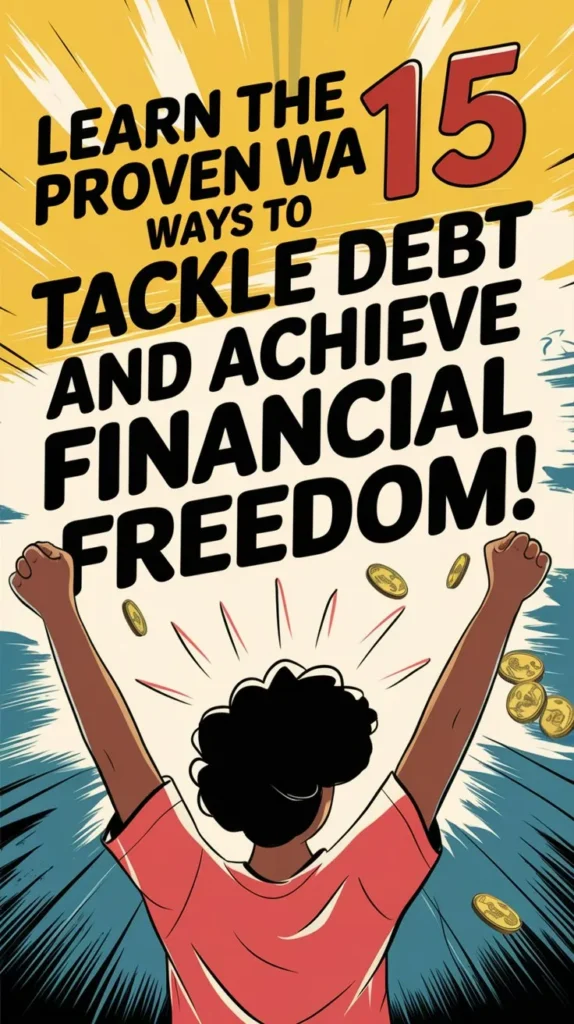


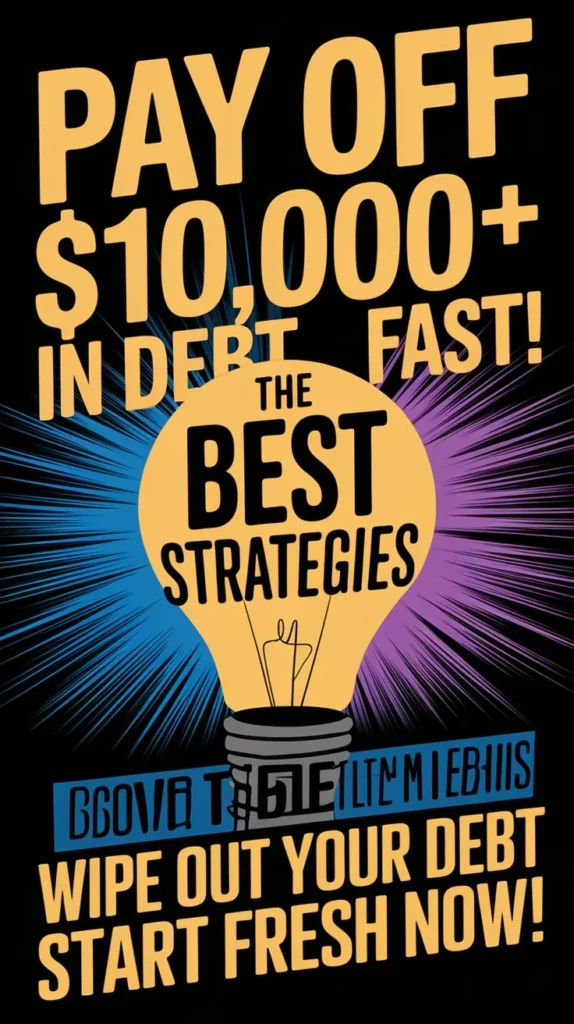

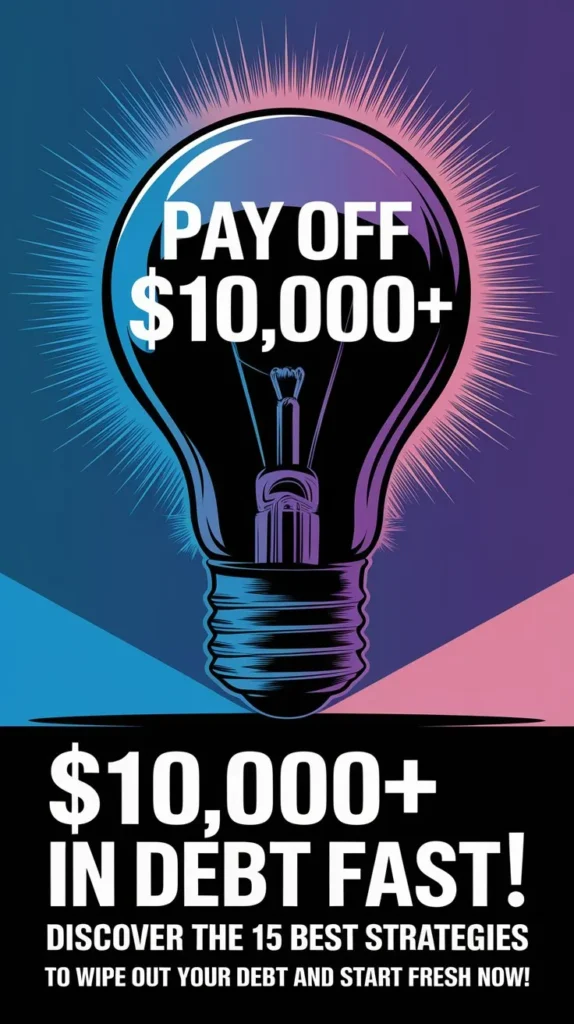
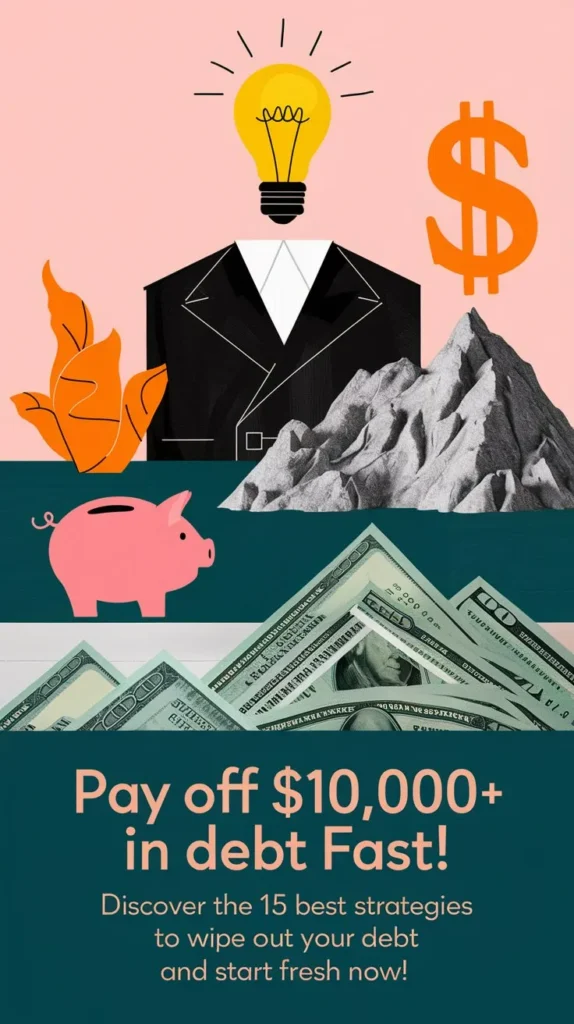
Last update on 2024-09-16 / Affiliate links / Images from Amazon Product Advertising API - Some of the links on this website are affiliate links, which means that at no additional cost to you, I earn a commission if you click through and make a purchase. I only recommend products and services that I believe will add value to my readers. Thank you for your support!
